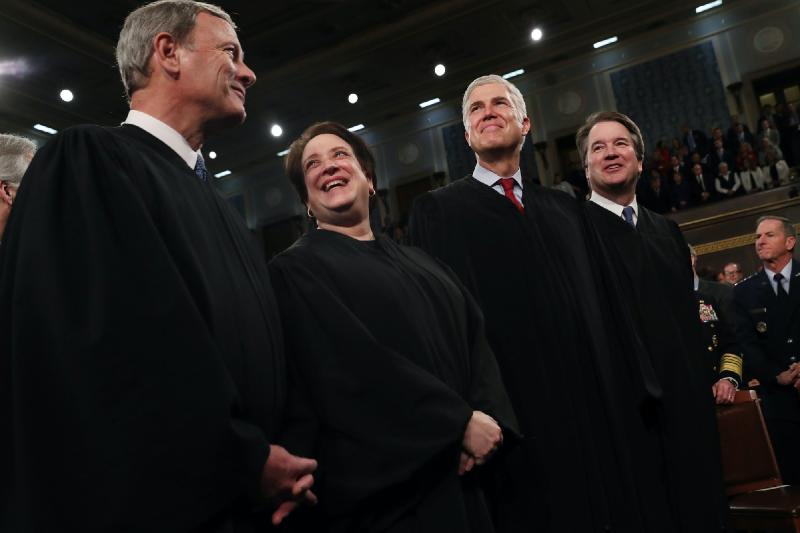Is the Supreme Court Scared of Tribal Sovereignty?



In 2003, writing a concurrent opinion in United States v. Lara , a case that determined an individual can be charged with the same crime in tribal and federal court, Supreme Court Justice Clarence Thomas described the contradictory nature of federal case law as it relates to Indigenous policy: “In my view, the tribes either are or are not separate sovereigns. And our federal Indian law cases untenably hold both positions simultaneously.” This week, nearly 20 years removed from Thomas’s assessment, the high court’s institutional inability to grasp the basics of tribal sovereignty was once again on full display.
On Monday morning, the Supreme Court heard oral arguments in McGirt v. Oklahoma, a case concerning whether the Muscogee (Creek) Nation’s 1866 treaty reservation boundaries are still legally in place . The MCN reservation was never officially dissolved by Congress, meaning that a large swath of what is now Oklahoma, formerly Indian Territory, is still technically under MCN jurisdiction, even if it is effectively governed by the state. The appealing party, Jimmy McGirt, is currently serving a life sentence for sex crimes he committed against a child. The case is not concerned with his guilt, which was well established, but rather the jurisdictional issues that arise from the fact that McGirt’s crimes were committed on what is still technically MCN land, but he was tried in state court. (Typically, federal courts have jurisdiction over major crimes committed on sovereign Native soil.)
The issue was initially argued in Murphy v. Carpenter last spring, but because Justice Neil Gorsuch, a Trump appointee, had heard the case when he was sitting on the Tenth Circuit, he had to recuse himself, leading to a 4–4 split . Seeking to bring in Gorsuch to answer the question definitively, the court took on McGirt, which quickly became one of the most intriguing tests of the United States Indian Country legal framework in recent memory. Listening to the arguments, as the public is now able to do because of the pandemic, it was clear that most of the justices had a staggering but sadly unsurprising lack of knowledge on the basic tenets of sovereignty and Indian Country.
The typical partisan lines that get drawn around other political, social, and legal issues in America are completely upended when it comes to matters of Indian Country. (Which is why I found myself, in a strange moment of dissonance, nodding in agreement with Thomas’s 2003 comments and would later find myself smiling at the comments of a Trump appointee.) And this week, as the arguments went along, it became increasingly clear that, of all the justices on the bench, it was Justice Ruth Bader Ginsburg and Justice Brett Kavanaugh who stood out as particularly misguided on the matter of tribal sovereignty.
(To Ginsburg’s credit, she did eventually come around, asking a question to the federal attorney about why tribally held land should be held to a less stringent standard for disestablishment than lands held by the United States. Ginsburg’s point was to contextualize the history of allotment and the creation of Oklahoma as a state, which happened without an express disestablishment of MCN’s reservation by Congress.)
Kavanaugh, for his part, was laser-focused on the racial demographics of the population within the MCN reservation at the time of Oklahoma’s statehood, pointing out that it was 60 percent white in 1890. (He was far less interested in acknowledging that this came about due to hordes of Americans illegally moving into Indian Territory to steal Native land.)
“By 1890 you have an odd situation of an Indian territory, nominally, that is predominantly white. The options of Congress at that time are to remove the whites or remove the Indians—neither of those would happen,” Kavanaugh said. “The other remaining options were tribal government over non-Indians, which is contrary to tradition, or to create a new state. Congress chose the new state option … I wanted to get that history out there because I think we are talking about Indian territory and reservations when it was 60 percent white, 10 percent Black, and 30 percent Indian in the relevant territory.”
In question after question, it was clear that the justices were primarily focused on how the non-Native people within the reservation boundaries would feel if the case came down on the side of MCN sovereignty, not on the matter of sovereignty for MCN citizens. “What would you say to those people, if we decide this case in your favor?” Justice Samuel Alito asked Riyaz Kanji, the MCN attorney. “Would they be surprised to learn that they are living on the reservation and that they are now subject to laws imposed by a body that is not accountable to them in any way?” Kanji replied that Alito’s concern would be moot, as state courts would still have jurisdiction based on past Supreme Court rulings.
This inquiry is nearly the exact same insulting line of questioning that Representative Tom McClintock, a Republican from California, raised last fall during a hearing on a bill that would allow the tribal law enforcement to prosecute non–tribal citizen offenders for crimes including sexual assault, sex trafficking, and stalking. He imagined a hypothetical situation in which a non-Native tribal casinogoer sexually assaulted a casino employee and would then be forced to answer to the courts of the sovereign nation. He described, in other words, how laws work, except he presented it as an outrage.
To follow up on the point Thomas was trying to make in 2003, Indian law is messy and complicated in large part because the U.S., for its entire history, has crafted and recrafted its laws to fit its pursuit of Native land, regardless of conflicting legal precedent or treaties. But if one is to read Murphy and McGirt straightforwardly, without overly concerning oneself with the limited practical effects, the through line is ultimately quite simple: Congress never explicitly disestablished the MCN reservation and now, a century after the U.S. set out to systematically steal the land of the Oklahoma tribes and assimilate their people, tribal attorneys are finally in a position to take action on the colonizer’s oversight.
“In the briefs, you make a lot of later demographics and evidence about what happened—I guess I’m struggling to think why that should be relevant in an interpretation of statutes from the last century,” Gorsuch said to the Oklahoma attorney, essentially pointing out that the state’s focus on the reservation’s demographics were more a distraction tactic than a constitutionally sound argument. “Especially when later demographic evidence sometimes shows nothing more than that states have violated Native American rights, including Oklahoma’s enforcement of its state laws on tribal lands against tribal members in the past.”
It’s a sucker’s bet to try to predict an outcome here, so I won’t. But the public nature of the questioning did expose how unfamiliar the majority of the justices are with Indian law and basic history. And like so many other non-Native people, their focus constantly lingered away from the American theft of Native land and abandonment of treaty rights. Gorsuch aside, the justices did not spend their limited time wondering what the ramifications of this violence have meant for generations of MCN citizens; instead, they found themselves repeatedly debating how a ruling in favor of a Native nation would affect non-Natives. It’s not a shock. This is how it’s always been. But given that these nine people are the ones entrusted with meting out justice for all of America, including Indian Country, it’s still more than a little disappointing that so little has changed.

In question after question, it was clear that the justices were primarily focused on how the non-Native people within the reservation boundaries would feel if the case came down on the side of MCN sovereignty, not on the matter of sovereignty for MCN citizens. “What would you say to those people, if we decide this case in your favor?” Justice Samuel Alito asked Riyaz Kanji, the MCN attorney. “Would they be surprised to learn that they are living on the reservation and that they are now subject to laws imposed by a body that is not accountable to them in any way?”
The basic tenets of Federal Indian Law are totally based on the U.S. Constitution that states "This Constitution, and the laws of the United States which shall be made in pursuance thereof; and all treaties made, or which shall be made, under the authority of the United States, shall be the supreme law of the land; and the judges in every state shall be bound thereby, anything in the Constitution or laws of any State to the contrary notwithstanding."
270+ treaties have been made between the U.S. and the Indian Tribes - the "supreme law of the land". The Five Civilized Tribes, and others, were shuffled off their homelands and sent to Oklahoma, the "New" Indian Territory, where non-Indians could not own property or live without permission from the Tribes/Nations. White homesteaders mobbed Indian Territory and, basically said, screw the Indians - I want MY land. Congress disestablished most of the reservations in OK - but not all.
The Creek Nation is one of the Tribes/Nations who never had their reservation disestablished, so, by law, by treaties, and by the U.S. Constitution, that land is still theirs.
How is SCOTUS gonna handle this conundrum?????
How is SCOTUS gonna handle this conundrum?????
How about we give the tribes the states of Iowa, Kansas, West Virginia, toss in one of the Carolinas and call it good. A step up from the bad deal of beads and blankets for Manhattan Island.
To answer the question honestly..... All the Supreme Court has to go on are all of the broken treaties, so not very well.
Hope you're well 1st.
Arkansas has really nice farm land. They can it, too
Interesting that you mentioned that Trout. Part of the treaty lands in Indian Territory for the Five Civilized Tribes includes some of the land in Arkansas
Would that be around Pine Bluff? The Quapaw were given a license to open a casino in Pine Bluff.
And not only do we have great farm land, we have some of the best fishing! But don't ask me because you have to find your own fishing hole
Still have to use cane poles or can you use the new store bought WalMart fishing gear???
We can use fancy fishing rods with reels and fishing line and spinner bait and everything!
The Quapaw tribe had some land near Pine Bluff (or was it Little Rcok?) anyway the state gave it back to them.
Doing well Fly. Golf courses opened up, so I'm back to playing three/four times a week. Bored I tell ya - BORED
After reading the story, those Quapaw are pretty slick - getting the sellers to think they were a dog-food company to keep the price of the 160 acres down to normal prices. Can't find anywhere that the BIA has agreed to put the land in trust, which would allow the tribe to open a casino, but that could be in the works.
I did a search to make sure I wasn't speaking out of my pinkie toe:
There was other land outside of Little Rock*** that was given back to them. That's not where the casino is going. They currently have an annex but are building a resort close by the annex.
***That must be where their dog food company is. And if the managed to come out better on the deal then I say good for them. It's payback
Doing more research - them guys signed an agreement in 2015 that they wouldn't put any casinos on their lands - in fact, they signed one in August and one in November. Then the Cherokee mentioned an interest in a casino in AR in 2017 and the Quapaw jumped into the fray looking at building 3 casinos in AR.
Wow - all I can say.
I'm glad somebody is getting some use out of that land. My only interest is in giving The Tribe my money
Fishing! did someone mention fishing? I'm somewhat of an expert on the subject.
I can save you gas money and the aggravation. Just mail your money to me.
IMRED
1 Slick Circle
Wholelottamoney, FL.
ROFL!!!!!!!!!!!
But then I can't get drunk and blame it on the beer!
I'm sure Mr. Giggles hasn't been blamed for anything large lately - he's an open chapter for the blame
Further checking found that the 160 acres will be used for a "resort" and the other 86 acres are in trust - which is where the tribe is/has opened the casino.
Mentioning the Quapaw tribe this is a pencil drawing of the oldest of the ''pureblood'' Quapaw. Anna Quapaw and that was in 1983. Pureblood isn't just 100% Indian blood, but 100% Indian blood from one tribe. This book is classic and there are numerous illustrations of the remaining purebloods from one tribe.
I have the first edition and signed by Charles Banks Wilson.
To me, it was fairly clear that it all goes back to how it will affect non-Indians in Oklahoma. This has always been the center of the argument against McGrit. Sadly it really doesn't have a damn thing to do with the law.
IMO, the decision will be in favor of the state of Oklahoma. Sadly, IMO, the real law and the history of taking of Indian land will have little to do with the final decision.
I hope that I'm wrong but history is against us as always.
And, to me, this is the entire crux of Congressional and SCOTUS's Federal Indian Law knowledge - "Indian law is messy and complicated in large part because the U.S., for its entire history, has crafted and recrafted its laws to fit its pursuit of Native land, regardless of conflicting legal precedent or treaties."
The U.S. government will not quit until they have all of our lands.
And reality past and current bear out that statement.
text of the argument:
Thanks TR - damn good read too.
It's going to be interesting. That's the back yard.
I haven't really been paying attention. Apparently, Murphy is still sitting on the shelf.
It was decided 4-4 because Gorsuch recused himself - so it is, indeed, sitting on the shelf to be reargued. Really surprised that the court heard McGirt before closing out Murphy.
Really?
The answer to the headline is yes.
Gorsuch would have to recuse himself again on the Murphy case. Perhaps that is why they are going with McGrit.
Hmmm - so, if they use McGirt for the reservation issue and get a go, then the Murphy case would be settled in rote. But, if McGirt is not approved, then Murphy would not be either.
Why wouldn't they use the Murphy - unless they are "hoping" that they will get another supreme to have a 5-4/4-5 decision?
OK - they are hearing the McGirt case so Gorsuch can "gently school" the justices on proper Indian law - pretty friggin' astute if ya ask me. With his teachings, the Murphy case would be a more fair hearing.
Like it.
The Murphy v. Carpenter case was 4-4, with Gorsuch recusing. "IF" Gorsuch goes for the McGirt, along with the other 4 who voted in favor of the Murphy case, McGirt would be a 5-4 decision in favor of McGirt. What impact would that have on the Murphy case when it is reheard?